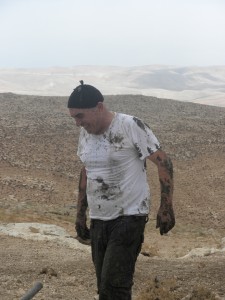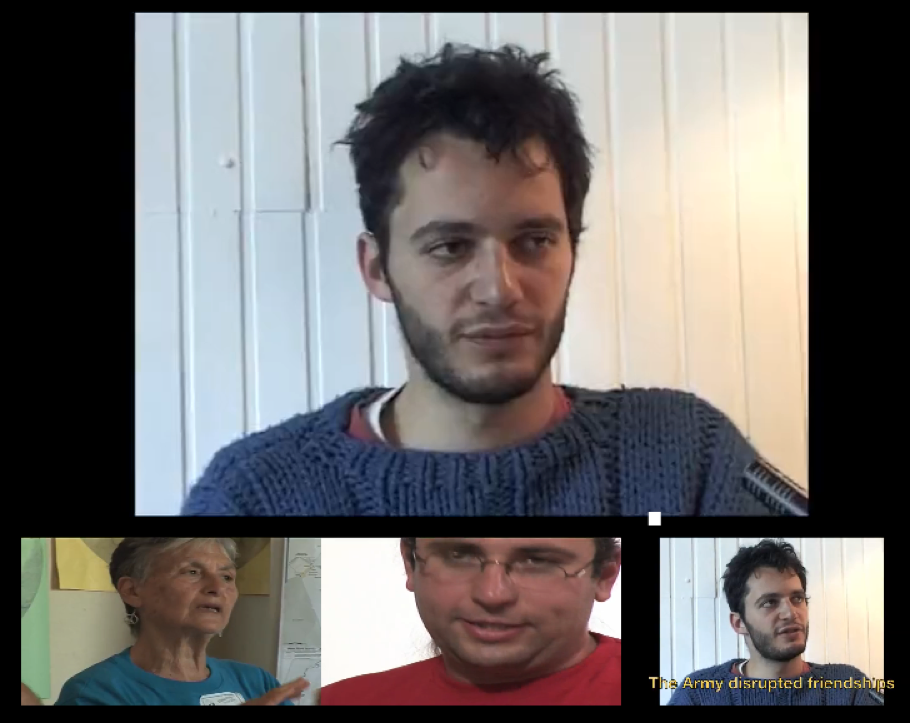The Only Democracy? » Featured, On The Ground Reports » Mud and Hope in South Hebron
Mud and Hope in South Hebron
June 26, 2010 Bi’r el-‘Id
There’s a strange beauty in the viscous black mud that comes up from the depths of the earth, from the bottom, or somewhere near the bottom, of the well we are cleaning in Bi’r al-‘Id. Bucket after bucket of it, lifted by pulley from down below, straggles to the surface, where we unload it and pour it out on the rocky escarpment. Its texture changes remarkably over the long morning hours from a watery top layer to heavy, shiny dark loam to a granular, sticky brown. It has a strong smell, like the sulphurous mud from the Dead Sea (not very far away) that people smear over their bodies for healing. Yehuda says the Palestinians of Bi’r al-‘Id should bottle it and sell it at the airport: “Sacred Mud from the Sacred Desert.” There’s no end to it. The buckets go down and up, down and up, heavier each time; the rope attached to the pulley is now caked solid with mud, and the escarpment has turned into a mire. Amiel, Dolev, and Danny are down in the dark recesses, filling the buckets alongside Haj Isma’il. Suddenly Ezra arrives—he was released from jail only a few days ago—and immediately lowers himself, like Spider Man, down the shaft. You can’t stop him. When they emerge hours later, they are black troglodytes, covered with mud from head to toe; and we, too, working the buckets above ground, are splattered, encrusted, soaked.
When I said goodbye to Amiel almost five months ago, he said, “We will meet in the spring, and when you get back, things will be the same here, just a little worse.” But actually in some ways they’re a lot worse. The continuing struggles against the occupation, on the ground in the territories, take their usual grim course, but inside Israel hardly a day passes without some new and sickening jolt. The country is in the grip of violent nationalist paranoia spiked with inventive forms of wickedness and active hatred for Palestinians, of an intensity I’ve never seen before. Here, for example, is what Yulia Shalamov Berkovitch, a member of the Knesset (from the Kadima “centrist” party), has to say: “”Israeli academia apparently suffers from ‘Palestinomania,’ a mild psychological illness whose symptoms include self-hatred, an affinity for Israel’s enemies, Jewish anti-Semitism and/or anti-Zionism. The spread of ‘Palestinomania’ demands the immediate and painful treatment for all of our sake, and the sooner the better” (Haaretz, June 21). I wonder what treatment she has in mind: Lobotomies? Re-education camps? Firing squads? In the same report, we learned that the Minister of Education, Gideon Sa’ar, thinks that it is “important to examine the issues” raised by a rabidly right-wing group called Im Tirtzu in a report on “anti-Zionist trends” in Israeli universities. According to Im Tirtzu, 80% of the reading materials assigned in the departments of Political Science in Israel are anti-Zionist and anti-nationalist and should, one must assume, be banned. They seem to have a black list, which no doubt includes the works of Rousseau, Plato, and John Rawls. The minister, whom some once saw as relatively enlightened, apparently goes along with this. The next step, I suppose, is censorship in the classroom, followed by book burnings in the public square.
Milder signs of the times are everywhere; the mayor of Ramat Hasharon in the coastal plain has decreed that in all schools that require a uniform, the pupils, from next year on, will have to tie Israeli flags to their wrists. He must feel, perversely, that a lack of patriotism is eating away at the foundations of our national existence. Add to this the decision by Jerusalem’s mayor Barkat to demolish 22 Palestinian houses in Silwan—the same homes we saved by an international campaign in 2005—and the ongoing, indeed escalating evictions of Palestinian families from their homes in Sheikh Jarrah. Barkat seems intent on setting the city on fire.
But here we are in Bi’r el-‘Id, where our Palestinian hosts are, miraculously, rebuilding the homes from which they were cruelly evicted over a decade ago. The sun is dancing, the wind fierce for a summer day, the sky endlessly open like the human heart at its best, like the desert stretching toward the horizon just below us. I ask my friend Muhammad how things have been during my absence. “Fine,” he says; “no problems.” Afterwards I hear that his father was recently assaulted by Yaakov Talya, the notorious settler-owner of the ranch aptly named Lucifer’s Farm, hardly half a mile away; when the soldiers turned up, they of course arrested Muhammad’s father. He is now awaiting trial. (Perhaps the military judges will send him to jail for the crime of having been attacked, as they have so many others we know.) And the road to Jinba, which we can see from our perch on the high ridge, has again been closed by the army after we punched it open with a water convoy last fall. Not long ago a boy from Jinba was seriously injured and had to be carried all the way up the mountain to the road near Bi’r el-‘Id. Two weeks ago settlers from Chavat Maon entered Palestinian Twaneh, threw rocks at the villagers, and tried to set a Palestinian house on fire. In short: Plus ça change….
Yet mud-stained, back aching, thirsty, I surprise myself today. I am borne along on a wave of irrational, happy hope. I have missed these weekends in South Hebron—missed the people, the Arabic, the desert landscapes, maybe even the danger. Each moment we spend here has its own irreducible value. Each act of defiant friendship is self-fulfilling, self-delighting. There it is again, that odd, unpredictable happiness, the heady wine of inner freedom. Yesterday we marched in protest in Silwan—some 500 ordinary Israelis doing the simple, the decent thing—and at first I was wondering where the Palestinians were (most were standing at their windows and doors and watching us), and my colleague Yossi Zeira said to me: “This is our task. No one will do it for us. Every good action counts and adds to the pressure. Slowly they will add up and bring change.” Alan, walking beside me, said he had felt tired after a day at work and almost didn’t come, and then he remembered a phrase from the end of Stephen Poliakoff’s film “1939”: “It is when the good people, or even those who are only half-good, remain silent that evil flourishes.” And there are moments of still deeper insight. When Eileen heard the rhymed slogan we’ve been chanting—”Ein kedusha be’ir kvushah, There is No Sanctity in an Occupied City”—she said: “Maybe there is sanctity only in an occupied city.” I think she’s right. Nothing in my experience comes as close to the meaning of a word like “holy” as the act of protest against what the municipality and the police are doing in Palestinian East Jerusalem.
That’s also what Istvan tells me as we work the buckets by the well. He’s a religious man, and to him these Ta’ayush hours in South Hebron are what religion is all about: truth, for example, and loving-kindness. “The settlers think that they represent the true Judaism,” I say to him, “and sometimes I’m afraid they may be right.” “No,” he says, “they are certainly wrong.” At moments a great simplicity emerges in the mind, like cleaning a muddy well, and you taste a giddy seriousness, a sudden lightening of the heart. Sitting beside us is Ziad Muhamra, shot point-blank in the face by a soldier some years ago when Ziad refused to take his goats off his ancestral grazing grounds. He told me his story last time I was here. Ziad survived, thanks to a devoted Israeli surgeon. He was in hospital for a year, fed by tubes. Today he remembers happily the moment he ate solid food again for the first time—a banana. It took him half an hour to eat it, and the whole ward, the nurses and the doctors and the other patients, all gathered round to watch this astonishing event. Now he has come back to Bi’r el-‘Id. When he mentions his doctor, searching for the foreign Hebrew name, it seems to me, for a second, as if this tough shepherd from the desert, a true survivor, is close to tears.
But some things are simpler than others. ‘Id has joined us today; we embrace like brothers when I see him. But his life in the village is perhaps no longer viable. People envy him—he is educated, articulate, self-possessed—and some don’t like the fact that he has Israeli friends. A few days ago Palestinians came to Umm al-Khair and tried to kill him; he managed to get away. He has a wife and a baby daughter, and it’s not clear where he can go; he’d like to study somewhere in Europe. He’s good with his hands, artistic by nature. Maybe we’ll be able to help him. Then there is Haj Isma’il, with his 33 children from four wives. How will he manage to support this huge tribe from his tent in the tiny, precarious khirbeh of Bi’r el-‘Id? He wanted to take a fifth wife, but the Qadi wouldn’t allow it, not even when Haj Isma’il tried to persuade him he’d already divorced the first wife. “I still have my strength,” he says, “and I don’t want to waste it or take it with me to the grave.”
“So how was jail?” I ask Ezra when he emerges from the well. “Akhla—great,” he says; “highly recommended.” He was imprisoned for a month after Judge Eilata Ziskind found him guilty of attacking a police officer during house demolitions at Umm al-Khair, where ‘Id lives. I have no doubt that the charge was cooked up by the police in order to punish a central figure in the non-violent resistance to the occupation. The first week in jail, in Jerusalem, was hard; they refused to allow him to receive books, so he went on hunger strike—for four days he ate nothing, until the prison authorities relented. Afterwards he was transferred to Dekel Prison in Beer-Sheva, where things improved. The cell was filthy, he says, and infested with cockroaches who paid no heed to human attempts to drive them away; they slept with him in his bed, emerged from his towel when he showered. One day he asked the commanding officer: “Are these part of the menu or part of the punishment?” He found a 50-meter stretch of corridor where he was allowed to walk, and every day he would pace it up and down, for hours. He lost a lot of weight. But there’s no trace of bitterness in him—quite the contrary, today he seems to me at peace, and full of hope. At lunch I say to him, “I hear you’re feeling optimistic.” He laughs. “Yes. Just look around. Two years ago we didn’t even know the name of this place. These people had been driven off their land, the houses and terraces were destroyed, the wells stopped up. Now we’ve brought them back and stood by them, and we’ve helped them to stand up to the settlers and the soldiers and not to be afraid. They are here to stay. They are home. You can train people so they become able to resist. Even a few people like that make a huge difference. In the end we will win. So of course I’m optimistic. You must be optimistic, too, otherwise why would you be here?”
Filed under: Featured, On The Ground Reports · Tags: Ezra Nawi, South Hebron Hills









 “You have a choice! Israeli Anti-Militarists Speak”
“You have a choice! Israeli Anti-Militarists Speak”